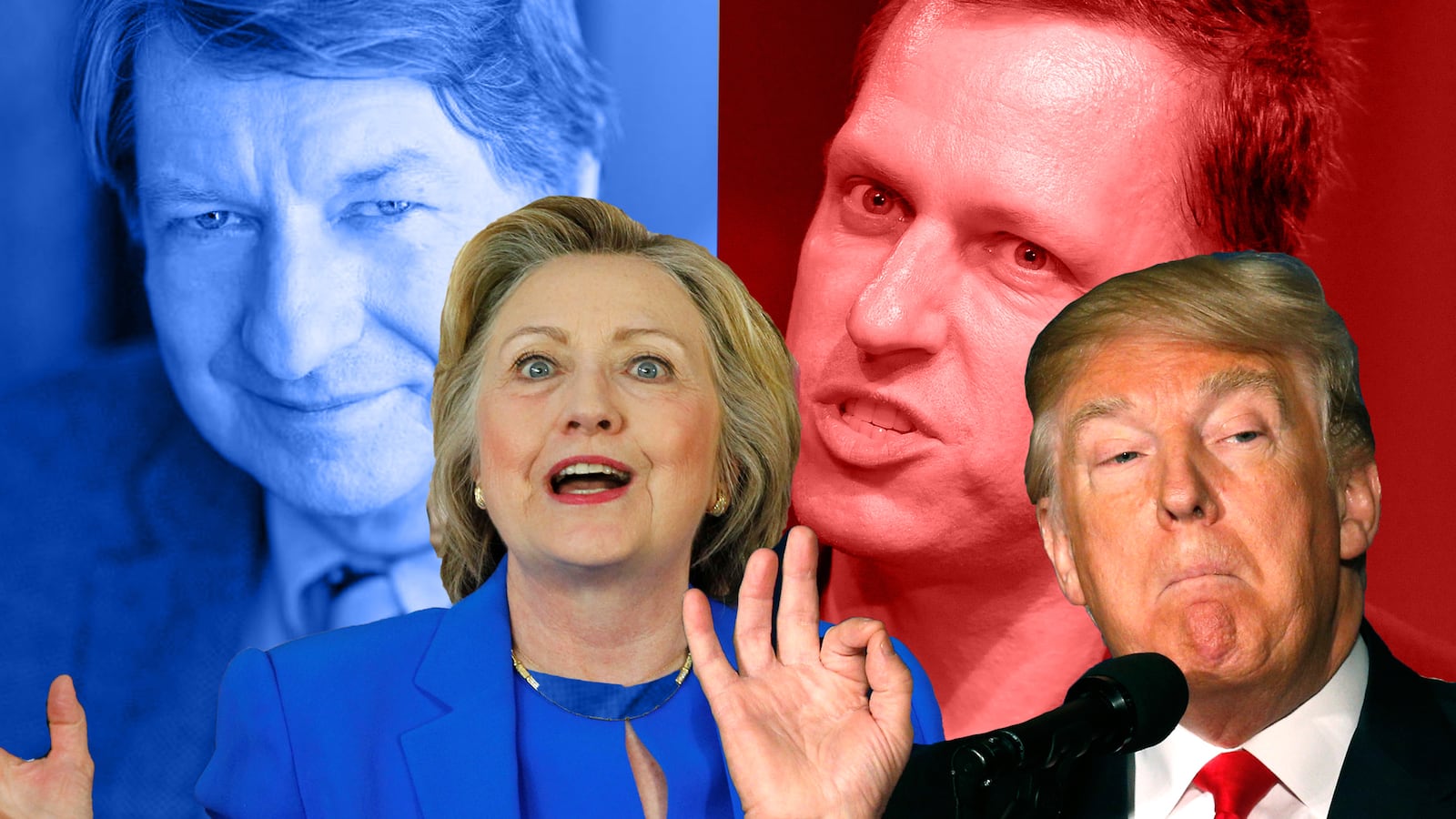Oh, P.J. O’Rourke, say it ain’t so!
Over the years, O’Rourke has led more than a few people to the lotus land of libertarianism through humor, invective, and stunning reportage from war zones. “Giving money and power to government is like giving whiskey and car keys to teenage boys,” he once helpfully explained.
And yet here he is endorsing Hillary Clinton for president.
"Hillary is wrong about everything,” he averred. “She is to politics and statecraft what Pope Urban VIII and the Inquisition were to Galileo. She thinks the sun revolves around herself.”
Still, he continued, “Trump Earth™ is flat. We’ll sail over the edge. Here be monsters.”
Like Little Marco Rubio, O’Rourke is particularly worried that a President Trump, however short-fingered, would have access to the nuclear codes, but unlike the Florida senator, he just can’t find it in himself to vote for The Donald or go full third party.
Hillary Clinton is particularly awful from a libertarian perspective (conservatives can at least get behind her neo-con foreign policy). Beyond the character defects, such as lying about being shot at in Bosnia and refusing to admit she used a ghostwriter for her books and newspaper columns, there is her almost-unbroken string of failures as an unrepentant hawkish secretary of state. During her tenure as senator from New York, she voted for the Iraq War and the Troubled Asset Relief Program while being ”adamantly against illegal immigrants” and same-sex marriage. She’s terrible on pot legalization, consistently opposing and dragging her feet on joining the 21st-century majority that supports treating marijuana like booze, and she’s been slagging NAFTA and free trade at least since her 2008 run against Barack Obama.
The one thing she never switches sides on is the Second Amendment. Despite decades of declines in gun-related crime and violence while gun laws have been relaxed, she’s made gun control a top issue in her campaign, even threatening executive action if Congress doesn’t do her bidding.
As my Reason colleague Matt Welch has copiously documented, Clinton has been antagonistic toward free speech and “permissionless innovation” in the tech sphere going back to the 1990s, when she supported the “V” chip and her husband’s attempts to force a ratings system on cable TV, classify encryption programs as “munitions” (thus subject to export controls), and mandate “backdoors” into all communications equipment. To this day, she sees Edward Snowden only as a traitor and even called for Facebook, Twitter, and other social media sites to deny “online space” to terrorists. “They cannot permit the recruitment and the actual direction of attacks or the celebration of violence,” said the woman who falsely accused a YouTube video of inciting the deadly attack on the U.S. Consulate in Benghazi, Libya. “They’re going to have to help us take down these announcements and these appeals.”
Even worse, Clinton waved away the First Amendment like so many purged emails: “You’re going to hear all of the usual complaints—you know, ‘freedom of speech,’ etc.” Christ, how many misbegotten drone strikes on innocent people and hospitals are hidden in that “etc.”?
You know who else has talked about ”closing that Internet up in some way,” right? And who further elaborated, “Somebody will say, ‘Oh, freedom of speech, freedom of speech.’ These are foolish people.”
That would be Donald Trump, who is himself a libertarian nightmare for any number of reasons, the first being that he takes conservatives seriously when it comes to reactionary positions on immigration, abortion, trade-protectionism, and the dumbest-possible iteration of “American greatness.”
Which brings us to Trump’s highest-profile—and certainly richest--libertarian supporter: Peter Thiel. The tech billionaire has had a hand in more than a few companies that have radically transformed modern life, especially the modern online life that Trump has called out for scrutiny. Thiel co-founded PayPal and was an early investor in everything from Facebook to Friendster to LinkedIn to Quora to Lyft, all of which have vastly expanded people’s ability to act, move, and especially speak more freely. Toward that latter end, he also supports the Committee to Protect Journalists.
Yet Thiel, who donated millions to a Ron Paul super PAC in 2012 and also gave money to Rand Paul in the current election cycle, is pledged to be a Trump delegate in the California Republican primary. Trump hasn’t just yammered on about shutting down the Internet—he also wants to “open up our libel laws” so he can sue the press for negative coverage. What’s American for aye, caramba?
Thiel has so far declined to say exactly why he’s become a Trump delegate, but we can guess a bit. Like O’Rourke, he doubtless (and correctly) realizes that either Clinton or Trump will be the next president and as a libertarian, making a deliberate choice, even just between Frankenstein and the Bride of Frankenstein, is valued.
Thiel has a history of supporting Republicans, whom I suspect he assumes are less immediately hostile to innovation and business (I’m not convinced, but then again, he’s the billionaire). Clinton is famously anti-Uber, Airbnb, and the whole sharing economy, an unfortunate trait she shares with progressive (and hypocritical) anti-hero Bernie Sanders. Trump seems to have little or no interest in what used to be the New Economy, but he is at least a businessman.
Like Trump, Thiel has a long history in calling out political correctness wherever he finds it and, despite his libertarian bona fides, isn’t dogmatically averse to government assistance in the business sphere. As a college and law school student in the late 1980s and early ’90s, he founded the Stanford Review, which editorialized against speech codes and leftist groupthink, and he co-authored The Diversity Myth: Multiculturalism and the Politics of Intolerance at Stanford.
Perhaps even more important, Trump’s signature phrase—”Make America Great Again”—might scratch Thiel’s worry that our most innovative days as a nation are behind us. His 2014 best-seller, Zero To One, chided millennials for thinking small when it came to entrerpreneurship and praised big-picture CEO (and PayPal co-founder) Elon Musk, whose success with Tesla, SolarCity, and SpaceX has been greased by $5 billion in government subsidies, loans, and tax credits. Trump, too, is unapologetic about mixing politics and business when it works to his advantage—and especially when it comes to mega-projects. One of Thiel’s biggest ventures, Palantir Technologies, got early seed capital from the CIA and counts numerous government agencies among its clients.
Thiel remains deeply pessimistic about the future. In a 2015 conversation with Mercatus Center and George Mason University economist Tyler Cowen (who shares his anxieties about a slowdown in technological advance), Thiel claimed, “It’s not at all clear that we’re living in anything resembling a democracy.” Rather, he suggested, the representativeness of government has been “largely superseded by these very unelected agencies of one sort or another, which really drive most of the decision-making.” Within the binary choice of Trump or Clinton in 2016, there’s no question that Trump at least gestures toward a future, even if it is one shrink-wrapped in 20th-century nostalgia for a less diverse country and American political and economic hegemony that is simply (and thankfully) impossible in a far-more-globalized world.
Not so long ago, Thiel—and O’Rourke, for that matter—counseled folks to look beyond politics for the real meaning of life. “Politics is about interfering with other people’s lives without their consent,” wrote Thiel in 2009. “Thus, I advocate focusing energy elsewhere, onto peaceful projects that some consider utopian.” For him, that meant ventures focused on things such as seasteading and life extension. In 2010, O’Rourke published a book titled Don’t Vote: It Just Encourages the Bastards.
Those sentiments still ring truer to me than actually endorsing and voting for either Hillary Clinton or Donald Trump. At the very least, I’d urge either of them—not to mention the rest of the country—to think about going outside of the major parties and voting Libertarian as a way to potentially drag politics into the 21st century.
Voting for the lesser of two evils is still evil and it’s not at all clear to me that the road to better candidates—not to mention smaller government—runs through either Cleveland or Philadelphia this summer.






